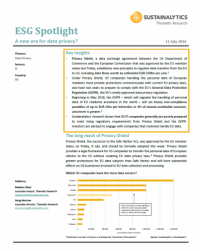Nouvelles diverses | Page 6
autres publications Nouvelles diverses
ESG Spotlight : A new era for data privacy? (billet de Julie Bernard)
Julie Bernard30 juillet 2016
Bonjour à toutes et à tous, l’agence de notation extrafinancière Sustanalytics vient tout juste de sortir un nouveau rapport dans le cadre de la série ESG Spotlight : « ESG Spotlight | A new era for data privacy? ».
En voici un résumé :
Sustainalytics’ new ESG Spotlight Series report, A New Era for Data Privacy?, considers the impacts of the new Privacy Shield agreement, which was approved by the EU member states last Friday, on US IT companies. Our research shows that US IT companies generally are poorly prepared to meet rising regulatory requirements from Privacy Shield and the General Data Protection Regulation (GDPR).
Bonne lecture !
Julie Bernard, MAP, Adm.A
Étudiante au doctorat (PhD) en sciences de l’administration (Management)
Faculté des sciences de l’administration
Université Laval
autres publications Nouvelles diverses
An Effective Compliance and Ethics Program is key
Ivan Tchotourian 30 juillet 2016
Intéressant document de la Securities and Exchange Commission en matière de criminalité économique : « 2014 GUIDELINES MANUAL – CHAPTER EIGHT – SENTENCING OF ORGANIZATIONS ».
These guidelines of the U.S. Sentencing Commission (Chapter 8) offer incentives to organizations to reduce and ultimately eliminate criminal conduct by providing a structural foundation from which an organization may self-police its own conduct through an effective compliance and ethics program. The prevention and detection of criminal conduct, as facilitated by an effective compliance and ethics program, will assist an organization in encouraging ethical conduct and in complying fully with all applicable laws.
In regard to ‘economic criminality’, however defined, it is equally crucial that regulators across the globe push and pull robustly and cooperatively for effective compliance and ethics programs within industries. Without regulatory/supervisory efforts (a situation that is a systemic risk by itself), ‘economic criminality’ will be nothing more than an academic subject of theoretical interest without any consumer protection values whatsoever. That may well be where the next financial crisis lies. Only the future will tell.
À la prochaine…
Ivan Tchotourian
autres publications Gouvernance Nouvelles diverses
Strong managers, strong owners : un ouvrage pour cet été ?
Ivan Tchotourian 28 juillet 2016
Harry Korine et Pierre-Yves Gomez ont publié un ouvrage qui vient de rejoindre ma bibliothèque : « Strong Managers, Strong Owners: Corporate Governance and Strategy » (Cambridge University Press, décembre 2013).
The family firm preparing generational change, the partnership that welcomes new partners, and the shareholders of a firm that chooses to go public are making decisions that will have an impact on strategy and management. Conversely, a change in strategy such as a move to diversify or a decision to take on more risk in a business can make the firm more attractive to some shareholders and less attractive to others and is therefore not ownership neutral. Opening the black box of agency theory, Korine and Gomez show how management and ownership interact to shape the strategy of the firm. In their view, the critical question to ask is not what is the best strategy, but rather, who is the strategy for? With numerous detailed examples, Strong Managers, Strong Owners is an invaluable resource for company owners, board members and executives, as well as their advisors in strategy and governance.
Voici la table des matières :
Part I. Changes in the Identity of Ownership and Management:
1. Change in ownership
2. Change in management
Concluding remarks
Part II. Changes in the Form of Ownership and Organization:
3. Change of legal structure
4. Change of organizational structure
Concluding remarks
Part III. Changes in Strategy:
5. Corporate and business strategies
6. Despite failure, NO change in ownership, management, or strategy
7. Because of success, reinforcement of ownership, management, and strategy
Concluding remarks
Part IV. Implications for Corporate Governance:
8. The board of directors
Conclusion – strategy for whom?
À la prochaine…
Ivan Tchotourian
autres publications Nouvelles diverses
Bientôt un nouvel ouvrage : The Oxford Handbook of Corporate Law and Governance
Ivan Tchotourian 27 juillet 2016
Voilà un ouvrage que tous les spécialistes vont bientôt s’arracher : « The Oxford Handbook of Corporate Law and Governance » (Oxford University Press, à paraître dans quelque temps).
Corporate law and corporate governance have been at the forefront of regulatory activities across the world for several decades now, and are subject to increasing public attention following the Global Financial Crisis of 2008. The Oxford Handbook of Corporate Law and Governance provides the global framework necessary to understand the aims and methods of legal research in this field.
Written by leading scholars from around the world, the Handbook contains a rich variety of chapters that provide a comparative and functional overview of corporate governance. It opens with the central theoretical approaches and methodologies in corporate law scholarship in Part I, before examining core substantive topics in corporate law, including shareholder rights, takeovers and restructuring, and minority rights in Part II. Part III focuses on new challenges in the field, including conflicts between Western and Asian corporate governance environments, the rise of foreign ownership, and emerging markets. Enforcement issues are covered in Part IV, and Part V takes a broader approach, examining those areas of law and finance that are interwoven with corporate governance, including insolvency, taxation, and securities law as well as financial regulation.
The Handbook is a comprehensive, interdisciplinary resource placing corporate law and governance in its wider context, and is essential reading for scholars, practitioners, and policymakers in the field.
À la prochaine…
Ivan Tchotourian
autres publications mission et composition du conseil d'administration Normes d'encadrement Nouvelles diverses place des salariés
Système allemand de codétermination : un modèle exportable ?
Ivan Tchotourian 22 juillet 2016
Alors que Theresa May a fait part de son intérêt d’importer en Grande-Bretagne le système allemand, MM. Horst Eidenmüller, Mathias Habersack, Caspar Behme et Lars Klöhn reviennent sur la pertinence de cette proposition en jetant un regard prudent (de chercheurs !) sur ce système : « Corporate Co-Determination German-Style as a Model for the UK? » (18 juillet 2016).
On 13 July 2016, Theresa May took up office as Prime Minister of the United Kingdom. Only shortly before, she had made headlines when she proposed to adopt European-style worker representation on the boards of leading companies.
Corporate co-determination hence seems to gain a certain degree of popularity with the British government – which is highly astonishing, considering that it was the UK which most fiercely fought against co-determination on a European level. It was mainly the diverging views of the UK and Germany on co-determination which have thwarted projects like the Draft Fifth Company Law Directive or the establishment of a European Private Company (Societas Privata Europaea, SPE). It is downright ironic that while the UK now shows an interest in co-determination, the concept is being questioned in Germany after decades of lying dormant. The reason for the new German discussion of co-determination are doubts regarding the compatibility of its specific form of co-determination with higher-ranking Union law. This post provides a brief overview of the most recent developments in German co-determination law that were the focus of a joint Oxford/Munich conference at the Ludwig-Maximilians-Universität (LMU) in Munich in March 2016.
À la prochaine…
Ivan Tchotourian
autres publications Normes d'encadrement Nouvelles diverses
Européanisation de la gouvernance d’entreprise par la soft law
Ivan Tchotourian 11 juillet 2016
Sur le blogue de l’Université d’Oxford, Idoya Ferrero-Ferrero et Robert Ackrill publie une synthèse de leur dernier article : « Is Europeanization Though Soft-Law a Reality in Corporate Governance Policies? ». La question qu’il aborde est simple mais très pertinente pour les juristes : Est-ce que la soft law européenne en matière de gouvernance d’entreprise fait évoluer les cadres juridiques étatiques (et ce, sans avoir besoin d’édicter des règles contraignantes !) ? La réponse est oui…
Europeanization addresses the impacts of EU membership on national politics and policies, via both the processes by which EU decision-making manifests itself at the national level; and the outcomes of that EU decision-making. Over time, as EU membership and policy scope have expanded, new approaches to policy-making have been developed and, therefore, new channels created by which Europeanization can occur. One such has been the use of ‘soft law’ processes. These have allowed for greater discussion of ‘sensitive’ policy issues, where national policy sovereignty continues to dominate, given that these discussions do not result in legal texts binding on the member states. That said, the purpose of soft law is still to deliver national policy change. Which begs the question – can they work?
À la prochaine…
Ivan Tchotourian
autres publications Nouvelles diverses
Baromètre de l’achat responsable 2016 : publication des résultats (exclusif !)
Ivan Tchotourian 16 juin 2016
L’ECPAR vient de rendre public les résultats de son baromètre de l’achat responsable 2016. Le Baromètre de l’achat responsable mesure et rend compte des pratiques et avancées en matière d’achat responsable. Je suis à la conférence présentement et vous divulgue en exclusivité le bilan. Qu’en retenir ?
- Plus de 90 % des 76 entreprises canadiennes ayant participé pratiquent de l’achat responsable.
- Parmi elles, 46 % déclarent que l’intégration totale du développement durable à leur modèle d’achat est un objectif de priorisation de leurs actions.
- Cette étude fait état de l’avancement des pratiques d’achat responsable en particulier au Québec.
Belle nouvelle pour la RSE !
À la prochaine…
Ivan Tchotourian



